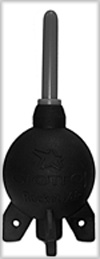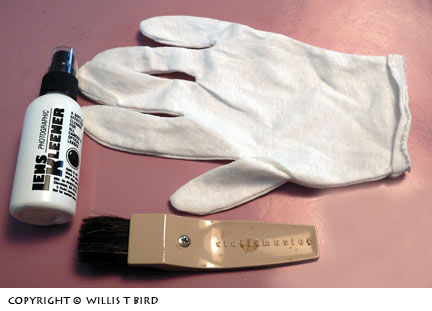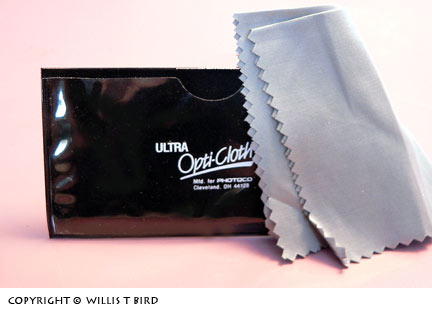
A gentle blower can remove dust from the mirror or any place inside the body. You may want to consider the Giottos Rocket Blasters.
Whether your camera is new or old, film, DSLR, or point-and-shoot, you should take care of it properly. Mistreatment or neglect can cause malfunctions or breakdowns in almost any camera. And, without a doubt, trouble will happen when you need the camera most.
When you purchase a new camera, you should to read your warranty and be sure to send in the card by mail or online. You may need the documentation later.
Some precautions of course are more obvious than others, such as being careful not to drop the camera or bang it against hard items. Some cameras are much more fragile than others. I’ve seen some break just because when they were turned on, the lens barrel wasn’t free to extend normally. The pressure of the motor against an object broke it. This simple accident ruined the camera. To make matters worse, the camera didn’t qualify for warranty repair, because the accident was considered to be mistreatment and that wasn’t covered. Some cameras require that you remove the lens cap before turning them on.
To protect the camera itself when you’re handling it, at all times be sure to have the camera strap either around your neck or wrapped securely around your wrist. And when you must leave your equipment in your car, be sure it’s out of sight. Folks with sticky fingers may not be able to resist the temptation to make an easy buck, and they’ll go after it.
Don’t leave a camera in a car in extremely hot weather…especially unprotected. I have previously mentioned using a foam ice chest to offer some protection, but it’s best not to leave a camera in places of extreme heat at all. Digitals seem to be even more vulnerable to heat than film cameras, but film is subject to breakdowns from heat, too.
Photographers who live in climates where the temperatures can dip very low know that cold can affect the life span of batteries. Oddly, lithium batteries and rechargeable Ni-MH cells last the longest in cold temperatures. Be sure to keep other types of batteries stored in a warm jacket pocket when they aren’t in use. Protect them from the cold as much as possible. And, in cold areas, remember to protect yourself by wearing warm clothing. Don’t forget to don gloves before you touch the camera and tripods. You don’t want to end up stuck to your equipment! And to avoid moisture in the camera or lens, let the equipment warm up slowly when going from one extreme temperature to another.
Another “duh” type warning is don’t expose your camera to water unless yours is an underwater camera or is weather resistant . Rain–or any moisture–can damage the electronic workings of any camera. If you’re photographing in the rain, use a 2 gallon-sized clear plastic bag with a hole cut for the lens or a camera sleeve to prevent moisture from getting on the camera and lens and keep the lens cap on between making images.
Remember to protect your camera from wind and dust. This hazard can occur on the road, in the field, or even at home, if you have a dusty house. Keep your camera in a secure bag to lock out dust and dirt, and, if possible, make certain your hands are clean before you handle the camera. There are two caps that come with every lens – front and rear. Front cap: Always keep the cap on when the camera is not being used. If you encounter dust, be sure to wipe your camera before changing lenses and then keep your back to the wind during lens changes. Rear cap: ALWAYS, ALWAYS place the rear cap on as soon as the lens is removed.
To protect your lens as you carry your camera around, keep the lens cap on. While photographing, it’s a good idea to use either a a UV filter or lens hood. I prefer to use just a lens cap – prefer not to have extraneous glass between the lens and my subject.

Cotton gloves, a good lens cleaning fluid and soft brush are essential cleaning tools for your new camera.

Lens cleaning cloths used carefully can also help keep your new lens free from dust.
There are many, many products on the market, and you’ll want items to clean both your lenses and your camera’s sensor. Visit a camera store or go online to learn more about them, and then include these items in your toolkit – cleaning clothes, lens “pens”, brushes, solutions, and a blower.
I would also carry a soft, lint-free cloth to wipe down your camera after photographing in unforeseen environmental elements (extreme dust, sand, moisture, etc.).
If you have a removable lens, use a gentle blower to remove dust from the mirror or any place inside the body. Note: Compressed CO2 gas cans are generally okay to use, but some of them can leave a residue, so check them carefully before using any on your camera. WARNING: Don’t use compressed air at all, as it contains liquid propellants that can leave residue on the sensors in digital cameras. Ask your local photo store dealer which products are safe to use.
Don’t wipe the mirror or sensor inside your camera, as this could scratch or damage important and delicate parts. You should use a specifically designed lens cloth to clean the outside of the lens glass after you’ve blown the grit away. Be very careful here, too, as it’s easy to scratch the glass. Never get your fingers on the glass itself, because the oils from your skin can cause harm to coatings on the lens. If it’s necessary to use a lens cleaning liquid, use it sparingly. If you have difficulty cleaning particles out of the camera body, let a professional clean the camera.
No matter how handy you believe yourself to be, never take your camera apart unless you’re a trained and qualified camera repairperson. You can get shocks from the currents generated inside and can cause all sorts of damage to the camera if you don’t know what you’re doing. In addition, when you’re storing your batteries, keep the terminals away from anything metallic. On the subject of batteries, bring spare, fully charged, batteries with you on those photo adventures. Don’t be caught with dead batteries when you need them most. Read your manual, and make sure you use only the type of batteries recommended for your camera.
In general, read your owner’s manual for tips on keeping your equipment in good working order. Like anything else, a camera will last longer if it’s taken care of properly.
by Willis T. Bird

Leave a Reply